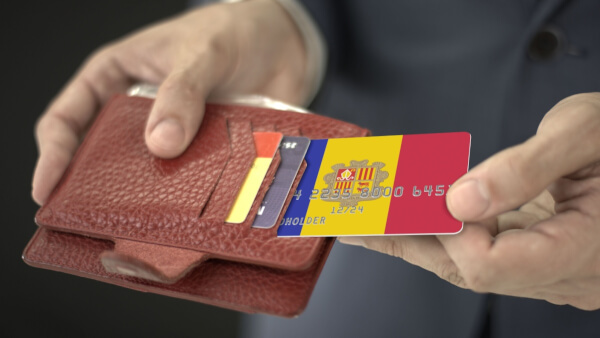Best savings accounts for non-UK residents
Read our roundup of the best savings accounts for non-UK residents, including options from Barclays, HSBC Expat, NatWest and Skipton International.

Planning to move to Europe for work, study or adventure? Perhaps you’re launching a business in France, have a holiday home in Italy or are a digital nomad working while you travel across the continent.
In any of these circumstances, a European bank account could be very useful to have. It’ll let you get paid and spend in euros, which are used across the eurozone area. This means no need for currency conversion, so you can manage your money just like a European local.
In this guide, we’ll be focusing on how to open a European bank account online. This could be convenient, especially if you’re still in the UK.
We’ll also show you an alternative from the money services provider Wise - the Wise account. It’s not a bank account but offers some similar features, and your money is safeguarded.
Over 12.8 million people worldwide use Wise to send, spend and convert money in euros and 40+ more currencies – for low, transparent fees* and no-markup exchange rates close to what you can see on Google. Plus, you’ll get dedicated support and volume discounts when sending large amounts.
Learn more about the Wise account ➡️
Yes, you can generally open a European bank account online. But it depends on the country and the bank, and what type of account you’re trying to open.
Many European banks these days offer an online application process, but some are a little more old-school. You may need to make an appointment to visit a branch in person, to hand in your documents or verify your identity. So, this may require a trip over to your chosen country.
If you want to complete the process fully online, your best bet may be a digital bank which operates throughout Europe.
Yes, it is possible to open a European bank account as a UK citizen. However, some countries and banks restrict access to their accounts to residents only. So you might need to wait until you move to the country to provide proof of address.
There are also special non-resident accounts available at some European banks. These may require minimum deposits and come with restrictions, but they should give you access to at least basic EU banking services.
The first step is to find a bank in your chosen country that accepts applications from non-residents. Alternatively, one which has a specialist non-resident account available.
These can be hard to find, so you’ll need to put in the time to do some research - and perhaps contact a few banks.
If you’re a customer with a bank that has an international presence, you may have better luck. If they operate in the European country you’re moving to, they may be able to help you open up an account there - either online or over the phone.
Major international banks often have an expat division, specially designed for people in your position – for example, HSBC’s expat account.
The process for opening a non-resident bank account online in Europe will vary considerably between countries, banks and accounts. But generally speaking, here are the steps you may need to follow:
| 📚 Read more: Best euro (EUR) accounts in the UK |
|---|
The requirements to open a European bank account vary from bank to bank, and from country to country.
But most banks will require a core set of documents. Here’s what to have ready, just in case:
If you go for a digital bank, the list of required documents is likely to be much shorter. You may simply need to provide your ID and a selfie photograph.
The time it takes to open a European bank account can vary considerably between banks. If a bank offers an online application process, it should be pretty quick and easy to complete your initial application.
Once you submit an online application for a bank account, the standard process is for the bank to send you a confirmation email. This will explain what will happen next, including how to access internet and mobile banking if available.
If your application is successful, you’ll receive your new debit card through the post along with details such as password, PIN numbers and account details.
If you have any problems, you’ll need to contact the bank’s customer services department to seek help or check on the status of your application.
While the process for opening a bank account is similar across Europe, a couple of countries make it ever so slightly easier for non-residents and foreigners.
One of these is Spain, where you can get a foreigner identification number (known as an NIE) to get round the requirement to have a local residential address.
Once you’ve applied for your NIE, you should find it pretty straightforward to open your account. Some Spanish banks such as BBVA even offer a basic bank account you can open online.
To help you get started, we’ve put together a list of some of the best European bank accounts for foreigners. These are accounts denominated in EUR that are available to UK citizens.
The following UK banks have a presence in Europe:
Open an HSBC Foreign Currency Account in EUR (one of 14 available currencies) and you can hold, send and receive money just like a European local. It doesn’t have a debit card however, so you won’t be able to shop and spend in euros.¹
HSBC also has a Global Money Account and debit card, which lets you send and spend in multiple currencies (including EUR) with no HSBC fees. You’ll need to be an existing HSBC customer to apply.
British banking giant Barclays has a foreign currency accountavailable in euros. You can open it in the UK, and then send and receive euro payments whenever you please (although fees may apply). You’ll need to be an existing Barclays customer first.²
Spanish-owned bank Santander also offers a Euro account. It has branches and ATMs both in the UK and Spain, along with a handful of other countries.
Become a Santander private banking customer (eligibility criteria applies) and you can open a Global Currency Account in euros. This is available as both a current and savings account, comes with a debit card and access to a whole host of private banking services.³
If you need a full-service international banking solution, this could be a good fit.
A bank account isn’t the only way to manage your finances in Europe, or in euros. Many expats, international students and digital nomads use the money services provider Wise instead.
Open a Wise account online and you can manage your money in multiple currencies, including GBP and EUR. It's not a bank account but offers some similar features and your money is safeguarded.
When sending money or converting currency between the UK and Europe, you’ll only pay a low, transparent fee* while also getting the mid-market exchange rate, close to what you can see on Google, every time.
And, you can spend like a local in multiple countries with your Wise card, including in France, Spain, Germany, Italy, Switzerland, Austria, Poland, Greece and all across Europe.
| Here’s an overview of the main benefits of using Wise: |
|---|
|
**Investments in funds are never guaranteed and your capital can be at risk. In the UK, Interest and Stocks are provided by Wise Assets — this is the trading name of Wise Assets UK Ltd, a subsidiary of Wise. Wise Assets UK Ltd is authorised as an investment firm and regulated by the Financial Conduct Authority (FCA). Our FCA number is 839689. We do not give investment advice, and you may be subject to pay tax. If you're not sure, seek qualified advice. You can find more information about the funds on our website.
Sources used:
Sources last checked on date: 18-Apr-2025
*Please see terms of use and product availability for your region or visit Wise fees and pricing for the most up to date pricing and fee information.
This publication is provided for general information purposes and does not constitute legal, tax or other professional advice from Wise Payments Limited or its subsidiaries and its affiliates, and it is not intended as a substitute for obtaining advice from a financial advisor or any other professional.
We make no representations, warranties or guarantees, whether expressed or implied, that the content in the publication is accurate, complete or up to date.

Read our roundup of the best savings accounts for non-UK residents, including options from Barclays, HSBC Expat, NatWest and Skipton International.

Check out our essential guide on how to open a bank account online, including bank types, required documents, fees, and more.

Check out our essential guide on how to open a bank account in Jersey as a British expat, including documents, fees, banks and much more.

Check out our essential guide on how to open a bank account in Monaco as a British expat, including documents, fees, banks and much more.

Check out our essential guide on how to open a bank account in Andorra as a British expat, including documents, fees, banks and much more.

Read our rundown of the best Nationwide USD account alternatives available in the UK, including HSBC, Lloyds, Wise, Barclays, Revolut and more.